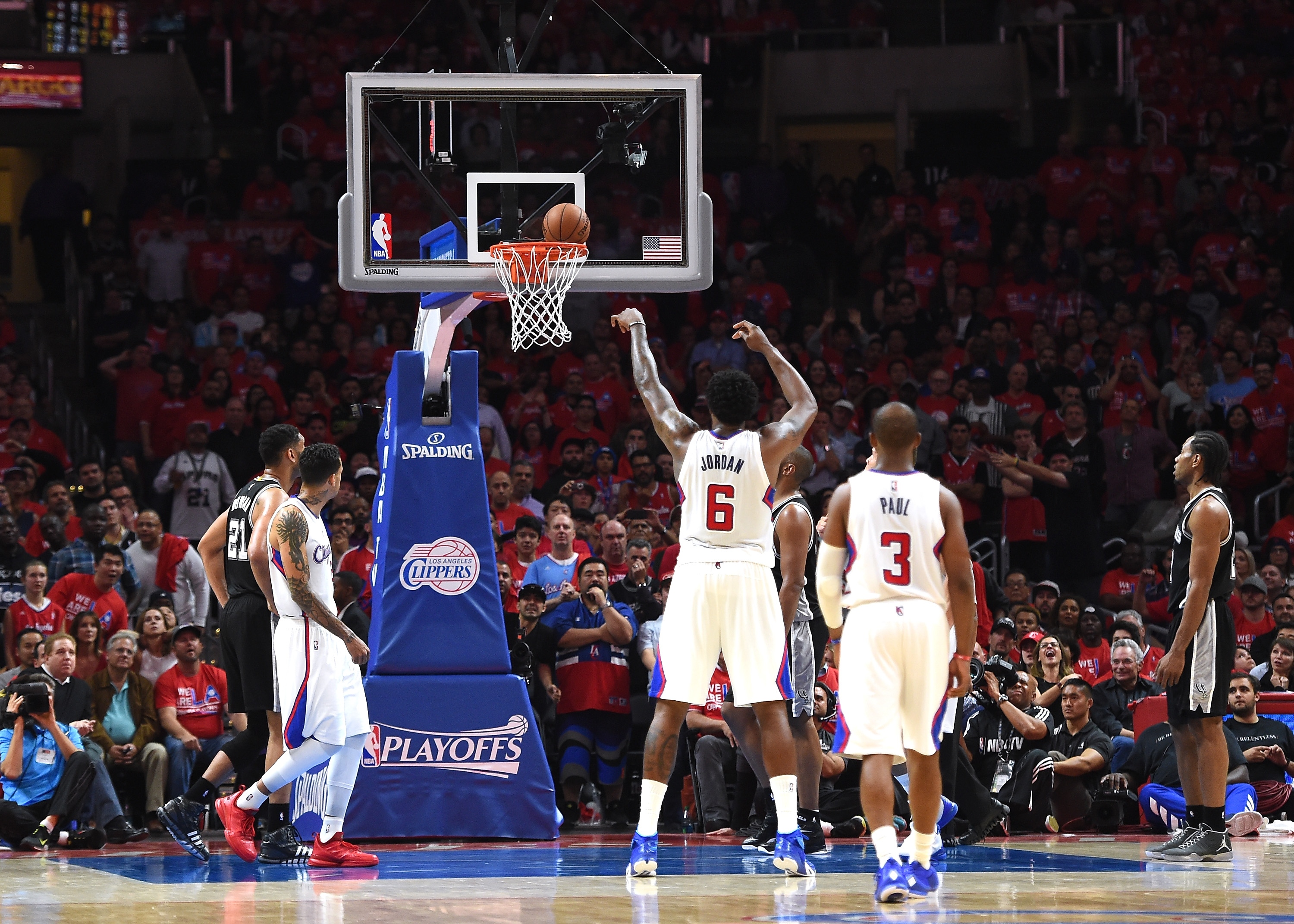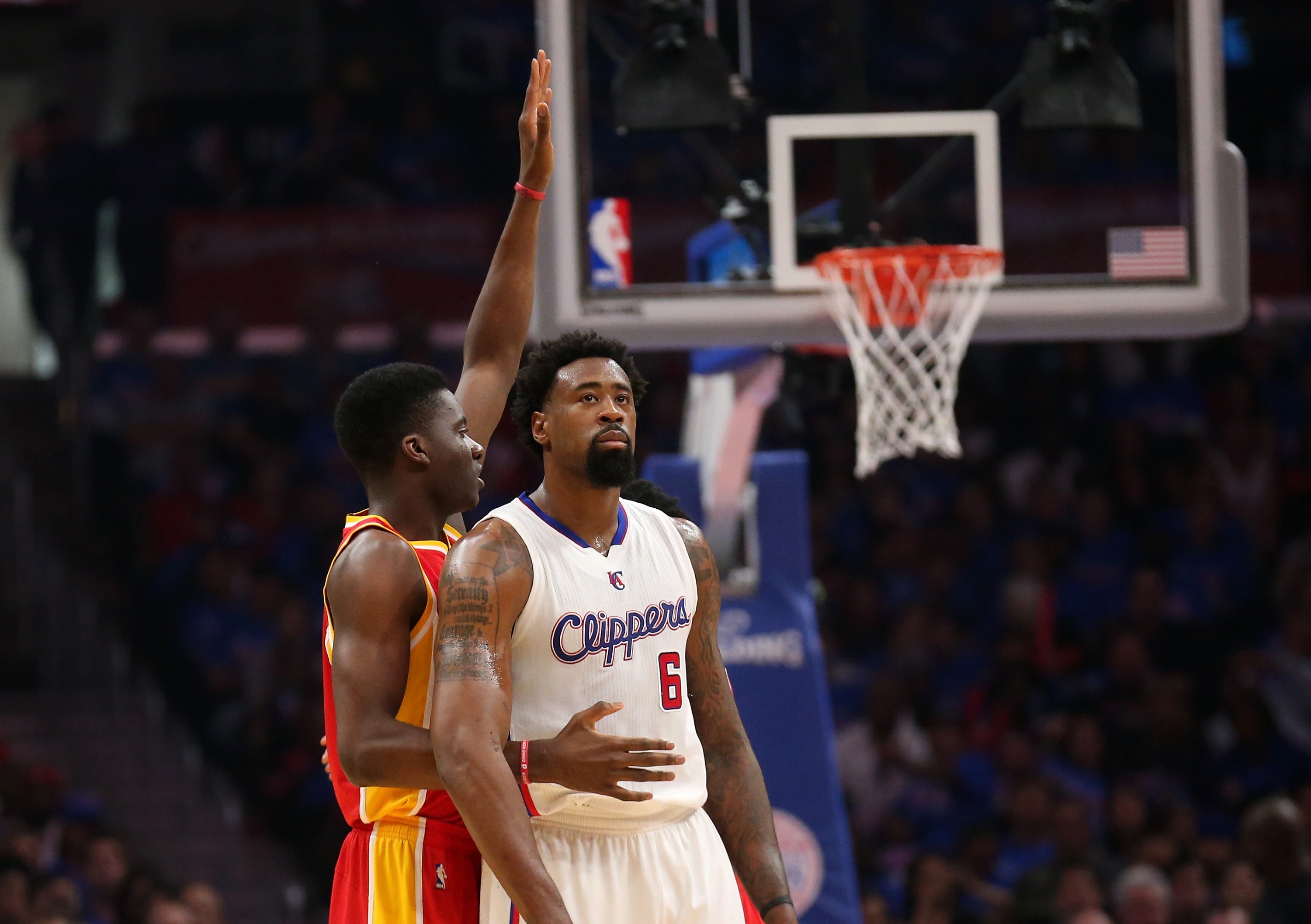Report: Not enough support among NBA GMs to get rid of Hack-a-Shaq
Intentional fouling poor free-throw shooters away from the ball, commonly referred to as “Hack-a-Shaq,” has become a major topic of conversation in this postseason. The strategic decision to hack specific shooters — most notably Los Angeles Clippers center DeAndre Jordan, but also Dwight Howard and Josh Smith of the Houston Rockets, among others — served as a lone sour patch in an otherwise brilliant first-round matchup between the Clippers and San Antonio Spurs, and has helped render the second-round affair between the Clips and Rockets nearly unwatchable at times.
But despite vocal opposition for the way Hack-a-Whoever eliminates game flow and elongates contests, it doesn’t sound like the league’s decision-makers plan to toss out the tactic anytime soon, according to CBSSports.com’s Ken Berger:
[Follow Dunks Don’t Lie on Tumblr: The best slams from all of basketball]
At the annual meeting of NBA general managers Wednesday in Chicago, there was no overwhelming consensus to change the rules to discourage teams from intentionally fouling poor free-throw shooters, league sources told CBSSports.com.
“There is not enough support to change it,” one executive in the meeting said. “It’s one of those perception is bigger than reality issues.”
League officials presented data on intentional fouling that strongly suggested the problem is an isolated one, despite all the attention it has gotten during the postseason. According to the data shared with GMs at the meeting, 76 percent of the intentional fouls this season — regular season and playoffs — have been committed against five players: DeAndre Jordan, Dwight Howard, Josh Smith, Joey Dorsey and Andre Drummond.
Jordan, the Clippers’ center who has been hacked into the next century through the first two rounds of the playoffs, has accounted for about half of all intentional fouls this season, according to the league data.
This is essentially the same response that league decision-makers offered back in 2008, when then-league executive vice president of basketball operations Stu Jackson said that “in the end, there wasn’t enough support to change it. There was a feeling that by changing the rule you would be essentially rewarding a player for a lack of skill by allowing him to stay in the game.”
The DeAndre-centric bent Berger noted has become even more crooked and gnarled in the playoffs, with the Clippers center getting intentionally fouled nearly as many times during the Spurs series (30) as all NBA players combined during the 2013 and 2014 postseasons (32), according to ESPN.com’s Kevin Pelton. And that was before the Rockets series, in which Jordan has attempted 71 free throws in five games, headlined by a 14-for-34 outing in a Game 4 win that saw him intentionally fouled 14 times before halftime alone.
So, yeah — it’s right up at the top of fans’ and observers’ minds at the moment. That’s just at the moment, though.
While Pelton’s research earlier this month indicated both a spike in the use of the strategy and an expansion beyond the scope of just a handful of targets, said spike has evidently not convinced enough movers and shakers that this is a capital-L, capital-P League-wide Problem necessitating sweeping change.
For one thing, there’s the perception that Hack-a-Whoever, in many instances, just doesn’t work. Remember, the Clippers decimated the Rockets in Jordan’s 34-freebie game, thanks in large part to the combination of Houston completely sabotaging its rhythm, forsaking the possibility of generating live-ball turnovers, and having to repeatedly attack the Clips’ set half-court defense, loaded up to snuff out every last James Harden isolation. (Also, the Rockets kind of seemed to quit.)
For another, there’s the argument that the league shouldn’t circumscribe a coach’s ability to strategically exploit an opponent’s shortcoming just because it’s not entertaining. Noted Hack-a-Shaq detractor and deployer Gregg Popovich recently summed up this view, as relayed by Dan McCarney of the San Antonio Express-News:
Do you anticipate any changes to the intentional foul rule?
“There will be a lot of discussion about the fouling, as there should be. But principle-wise, I feel really strongly that it’s a tactic that can be used. If someone can’t shoot free throws, that’s their problem. As I’ve said before, if we’re not allowed to do something to take advantage of a team’s weakness, a trade should be made before each game. ‘We won’t foul your guy, but you promise not to block any of our shots.’ Or, ‘We won’t foul your guy, and you allow us to shoot all uncontested shots.’
“So we’d have to make a trade. On an intellectual or principle basis, I think you’re on high ground. Now, visual-wise, it’s awful. It couldn’t be worse. I tend to side on the principle side where it’s basketball, and if we have a guy who can’t shoot and it’s an important part of the game, I should probably get him off the court. We’ll see how it comes out. I’m sure the way it looks will be discussed very seriously by the league.”
There’s also the belief espoused by many, including a number of former players and coaches, that changing the rules to benefit those who can’t shoot free throws well enough to make opponents pay for intentional fouling would in some way bastardize the game by eliminating an important part of it.
NBA Commissioner Adam Silver — who has somewhat pearl-clutchingly invoked the nation’s children in the matter, worrying that getting rid of Hack-a-Whoever might “send the wrong message to youth basketball” — recently shared such thoughts with a group of Associated Press Sports Editors:
“I’ve gone back and forth,” Silver said […] “I’ve sat in meetings with some of the greatest players like Michael Jordan, Larry Bird who said that players should learn to make their free throws and it’s part of the game. At the same time, it doesn’t make for great television, so I’m on the fence right now.”
Silver said he finds it to be a “fascinating” strategy in some cases.
“But in other games I watch it and I think, ‘Oh my god, I feel people changing the channels,'” he said. “So we’re also an entertainment property that’s competing against a lot of other options that people have for their discretionary time.”
That, to me, seems the most compelling reason to make a change. At a time when the league’s intent on pursuing whatever tweaks it can to shorten and speed up games, and make its product more attractive to the viewing audience for whom ESPN and Turner Sports will pay $24 billion over the next nine years, it can’t possibly be in the NBA’s best interests to continue co-signing a strategy that can keep non-overtime playoff games going until nearly 2 a.m. on the East Coast, can it?
There are reasonable counterpoints to all these arguments in favor of maintaining the Hack-a-Shaqtus quo. I’d suggest checking out Tom Ziller’s step-by-step refutation at SB Nation, which features my favorite turn of phrase on the topic: “As far as fascinating tactical wars go, I much prefer actual basketball.”
It’s also worth noting that the NBA has taken some lab-test steps in the direction of an intentional foul cure, making a change on the D-League level that expands the NBA’s last-two-minutes rule on intentional fouls — in the final 120 seconds of regulation or overtime, the team on the receiving end of an away-from-the-play foul receives one free throw attempt that can be taken by any member of the team on the floor at the time (meaning the guy who got fouled doesn’t have to be the one to shoot it) and retains possession of the ball — throughout the entire game.
The NBA’s general managers, however, seem to remain unmoved that the D-League tweak or any other proposed adjustment would result in either a better entertainment product or a better game than what we’ve got now. That could change this summer, when the league’s Competition Committee — which includes Clippers coach Doc Rivers, who’s got to be getting pretty sick of watching Jordan march to the free throw line — meets during Las Vegas Summer League and can recommend a rule change to the NBA’s Board of Governors.
As it stands, though, the hacking seems likely to continue, so you’d better keep extending the recording time of Clippers games on your DVR. Just go an extra 90 minutes. Better safe than sorry.
– – – – – – –
Dan Devine is an editor for Ball Don’t Lie on Yahoo Sports. Have a tip? Email him at devine@yahoo-inc.com or follow him on Twitter!
Stay connected with Ball Don’t Lie on Twitter @YahooBDL, “Like” BDL on Facebook and follow Dunks Don’t Lie on Tumblr for year-round NBA talk, jokes and more.

